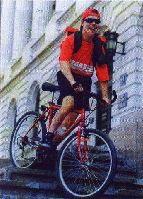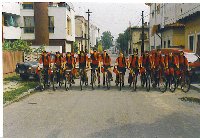
When 29-year old Scot James Gray-Cheape announced he was intending to start an intra-city courier service in Bucharest many people simply diagnosed it as a symptom of too much cold wind blowing up his kilt. When he added that he planned to recruit orphans into his courier team, most people decided the diagnosis was much more serious than that. But 10 months down the line, Pegasus is probably the best recognized intra-city courier service in Bucharest, with a steady expansion of staff and new services and Gray-Cheape constantly challenging people’s negative perceptions.
Arriving in Romania two years ago to visit old friends and explore potential business opportunities, James Gray-Cheape felt there was a demand for a speedy, reliable courier service that concentrated solely on the delivery needs of Bucharest-based business. Feedback was both negative and positive, he recalls, with many suggesting now wasn’t the right time for such a service and others urging him to take the risk. “I decided, I am going to go for this. I really wanted something that was young, sporty and energetic. I wanted to supply good, fast, efficient service.”
He moved back to London to work with some courier services, researching both the management side and the “on the street” work. He built up a template there of how his Bucharest company would operate and returned to Romania in January 1997 to start work.
During this time, a old friend of his from Scotland was teaching English in one of the local orphanages called Casa de Copiii 7 (House of the Children). When they met up at the weekends, his friend would tell him of his exertions at the orphanage and of the great guys he was teaching who were genuine, polite and enthusiastic young lads and who blew out of the water all the stereotypical depictions people may have had of orphans as being “wild, drunken louts.” Eventually, when the time came for his friend to return back to Scotland, Gray-Cheape asked to meet these young men. “There I was sitting in a bar when in walked this group of guys who were just brilliant. They were a laugh, extremely pleasant and polite and there was a real team spirit amongst them. I don’t know what my perception of an orphan would have been but from what I saw, these guys were amazing.”
A month went by and Gray-Cheape faced the task of finding the right staff to make his courier business “young and energetic.” He put two and two together. “I thought to myself, what type of manpower am I looking for – 20 year olds, guys I can trust, guys who are fit and who hadn’t had a soft, easy upbringing, who wouldn’t refuse to work if it simply started to rain. I remembered the guys from the orphanage, consulted with my friend and we both thought it would be ideal.”

“Here you had a horde of guys who were in a difficult situation and who didn’t have enormous chances because they were starting off on the bottom rung of the ladder. I thought I could kill two birds with one stone. I could get the sort of guys I wanted – fit, tough, polite, and keen, who spoke English – and this was great for the business side. Then from the philanthropic side, it gave them a move up the ladder because they were becoming old enough to leave the orphanage to try and find work.”
Romanians, in particular, discouraged him from employing orphans. They said they would be wild and badly behaved. They stressed that people would not be happy knowing that orphans were delivering their packages. “I really knew the guys were not like this and I wanted to prove, anyone who thought this, wrong, for believing this. It may sound arrogant for a foreigner to say this in someone else’s country, but I believed it important to give them a chance. Now they have had their chance and they have made Pegasus what it is, not me. They have gone through rain, hail, ice and snow and the respective growing pains any small company endures and they have proved themselves.”
I ask Gray-Cheape what his response is to the potential claim that his recruitment of orphans may be seen as exploitation of cheap labor. “Firstly, only 30 percent of Pegasus Couriers come from the orphanage. Everybody is paid in relation to the amount of work they complete and not according to their background. These young men fulfilled the recruitment criteria of all Pegasus Couriers, which are reliability, trustworthiness and high motivation. These qualities you do not get when you employ cheap labor,” he responded.
In its mere 10 months, Pegasus has indeed proved itself. It now employees 25 people, offers three different services and according to Gray-Cheape has “managed to break through and get over the initial capital investments and still maintain a good name.” Investment is through a British joint venture and “all returns are reinvested into Pegasus.”
“The service has mainly hit the multinational expat community but it is filtering, albeit slowly, into Romanian businesses. Actually, this is one of our biggest barriers – trying to eat away at this mentality that says courier services are superfluous and extravagant. Over here, the usual thought is to have drivers who do almost everything. So people are suspicious about handing over cash on the spot to a courier instead of paying the driver his wages at the end of the month.”
“I would advice people to cut down the number of drivers they have and subcontract out package deliveries. The remaining drivers can concentrate on picking up people from the airport etc. get rid of the damages that happen to cars, the cost of a car, insurance or the police problems. Tighten up the staff. Dynamic companies are the ones that really watch their costs, understand the concept of a courier service and realize how effective it can be.”
Gray-Cheape believes that the most important thing about his business is to offer prompt, reliable service, a concept he feels is seriously lacking in Romania. “We are growing at a controllable rate, and if a job is too big, we’ll explain to the client that we don’t want to be stretched and fail to provide the excellent service we sell.”
As part of its expansion, the company introduced different services in response to demands from its clientele. The initial service was door-to-door delivery – “pick up, drop off, direct” – within the city limits. Collection time was between 30 to 60 minutes and depending on which of the three zones was target – CBD, Inner, Outer – the price varies between $2.5 or $8. Service highlights include registered delivery, confirmation of delivery and package tracking.
Mailshot service provides the registered hand delivery of large quantities of packages. Two thousand packages can be delivered within 50 hours, at 49 cents each. “Clients usually send invites, launches, publications and invoices. It’s a foolproof way to send invoices because the receiver must sign for the document and as such cannot claim that he did not receive the invoice,” says Gray-Cheape.
The Fulfillment service is the final and latest offering. Companies provide Pegasus with envelopes, contents and database (or alternatively label stickers) and the courier service will do all the packing, addressing and sending, whether it is by hand delivery, domestic mail or international mail. It frees up their staff from time-consuming labor to enable them to concentrate on their respective jobs.